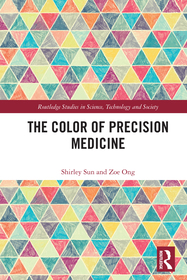
The Color of Precision Medicine
Sorozatcím: Routledge Studies in Science, Technology and Society;
-
10% KEDVEZMÉNY?
- A kedvezmény csak az 'Értesítés a kedvenc témákról' hírlevelünk címzettjeinek rendeléseire érvényes.
- Kiadói listaár GBP 42.99
-
20 538 Ft (19 560 Ft + 5% áfa)
Az ár azért becsült, mert a rendelés pillanatában nem lehet pontosan tudni, hogy a beérkezéskor milyen lesz a forint árfolyama az adott termék eredeti devizájához képest. Ha a forint romlana, kissé többet, ha javulna, kissé kevesebbet kell majd fizetnie.
- Kedvezmény(ek) 10% (cc. 2 054 Ft off)
- Kedvezményes ár 18 484 Ft (17 604 Ft + 5% áfa)
Iratkozzon fel most és részesüljön kedvezőbb árainkból!
Feliratkozom
20 538 Ft

Beszerezhetőség
Becsült beszerzési idő: A Prosperónál jelenleg nincsen raktáron, de a kiadónál igen. Beszerzés kb. 3-5 hét..
A Prosperónál jelenleg nincsen raktáron.
Why don't you give exact delivery time?
A beszerzés időigényét az eddigi tapasztalatokra alapozva adjuk meg. Azért becsült, mert a terméket külföldről hozzuk be, így a kiadó kiszolgálásának pillanatnyi gyorsaságától is függ. A megadottnál gyorsabb és lassabb szállítás is elképzelhető, de mindent megteszünk, hogy Ön a lehető leghamarabb jusson hozzá a termékhez.
A termék adatai:
- Kiadás sorszáma 1
- Kiadó Routledge
- Megjelenés dátuma 2025. szeptember 29.
- ISBN 9781032565637
- Kötéstípus Puhakötés
- Terjedelem160 oldal
- Méret 234x156 mm
- Súly 300 g
- Nyelv angol
- Illusztrációk 1 Illustrations, black & white; 1 Line drawings, black & white; 3 Tables, black & white 699
Kategóriák
Rövid leírás:
This book proposes the concept of racialization of precision medicine, defined as the social processes by which racial/ethnic categories are incorporated (or not) into the development, interpretation and implementation of precision medicine research and practice. An important resource on how to deracialize precision medicine
TöbbHosszú leírás:
Will genome-based precision medicine fix the problem of race/ethnicity-based medicine? To answer this question, Sun and Ong propose the concept of racialization of precision medicine, defined as the social processes by which racial/ethnic categories are incorporated (or not) into the development, interpretation, and implementation of precision medicine research and practice.
Drawing on interview data with physicians and scientists in the field of cancer care, this book addresses the following questions: Who are the racializers in precision medicine, how and why do they do it? Under what conditions do clinicians personalize medical treatments in the context of cancer therapies? The chapters elucidate different ways in which racialization occurs and reveal that there exists an inherent contradiction in the usage of race/ethnicity as precision medicine moves from bench to bedside. The relative resources theory is proposed to explain that whether race/ethnicity-based medicine will be replaced by genomic medicine depends on the resources available at the individual and systemic levels. Furthermore, this book expands on how racialization happens not only in pharmacogenomic drug efficacy studies, but also in drug toxicity studies and cost-effectiveness studies.
An important resource for clinicians, researchers, public health policymakers, health economists, and journalists on how to deracialize precision medicine.
TöbbTartalomjegyzék:
Table of Contents
1 . Introduction
Precision medicine (PM): A global phenomenon
What is precision medicine? Definitions, sites and scale.
Precision medicine as an alternative to race-based medicine
What is race-based medicine and racial profiling in medicine?
Problems with race-based medicine/racial profiling in medicine
Is genome-based precision medicine really the answer?
Addressing the debate: Racialization as the key concept
Racialization of national census categories
Racialization in science (or, scientific racism) in colonial contexts
Racialization of medicine in colonial contexts
Racialization in medicine in contemporary times
In the (post-)Genomic Era: Racialization of human genomic science
What is the future of genome-based precision medicine? An empirical examination in cancer care in three post-colonial societies.
Chapter outline
2 . Using race to overcome race: An inherent contradiction in precision medicine
Introduction
Using race to overcome race: understanding an inherent contradiction in translational precision medicin
First domain: Searching for the genetic biomarker in scientific research
Second domain: Recruiting suitable human subjects for clinical trials
Third domain: Medical decision-making in the clinic
Conclusion
3. Trans-National colors: Race, Ethnicity and Genomic Science in the United States of America, Canada and Singapore
Introduction
Is race biological or socially constructed? A brief overview.
Where and how do racialization happen in genomic science?
Materials for racialization of a population sample and/or patient
Issues with the different ways of racialization
Perspectives from the genomic science community about the relationship between race and genetics
No clear distinction between ethnoracial population groups
Genetic heterogeneity within an ethnoracial population group
Race as a social construct
If race is socially constructed, why are there differences in frequencies of genetic alleles between racial/ethnic groups?
If not race, what drives human genomic diversity?
Conclusion
4. The “relative resources” model: Heterogeneity of resources and the racialization of precision medicine
Introduction
The “personalized medicine” versus “racialized medicine” debate
“Race is really the poor man’s genomic test”: The relative resources model
Human and informatics resources
Legal and infrastructural resources
Implications of the relative resources model
5. Pharmacogenetic/Pharmacogenomic Drug Toxicity Studies, Race/Ethnicity and Managing Adverse Drug Reactions in the Clinic: Ongoing Tensions
Introduction
Examples of racialised pharmacogenomic studies in the US, Canada and Singapore
Allopurinol
5-Fluorouracil (5-FU)
Cost-effectiveness studies, race/ethnicity and precision medicine
Who is Asian and who is Caucasian?
Debating race/ethnicity-based pharmacogenetic toxicity data in the clinic
Subjective interpretation of drug toxicity risks
Toxicity is a multi-factor phenomenon and is not just about genetics
Pharmacogenetics/pharmacogenomics studies and pharmaceutical companies are at odds.
Conclusion
6 Conclusion
What is already known on the topics of race-based medicine, precision medicine, and the molecularization of race?
What does this book add to the existing state of the art?
What are the arguments and findings in each chapter?
How might this study affect research, practice or policy?
Research
Practice
Policy
Science communication by scientists and journalists
Medical education
What should different stakeholders take away from this book?
Scientists
Physicians/medical doctors
Public policy makers
Health economists
What are the theoretical and empirical contributions of this book?
On “racialization”
On the nexus of relative resources and racialization of precision medicine
On differential racialization
What are the tensions with the usage of race/ethnicity in genomic science with medical and public health implications?
What are some of the limitations of this study?
What are some of the future research projects based on this book?
Több







